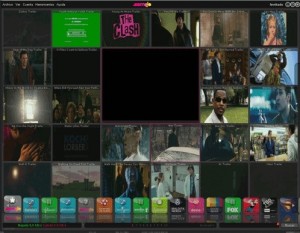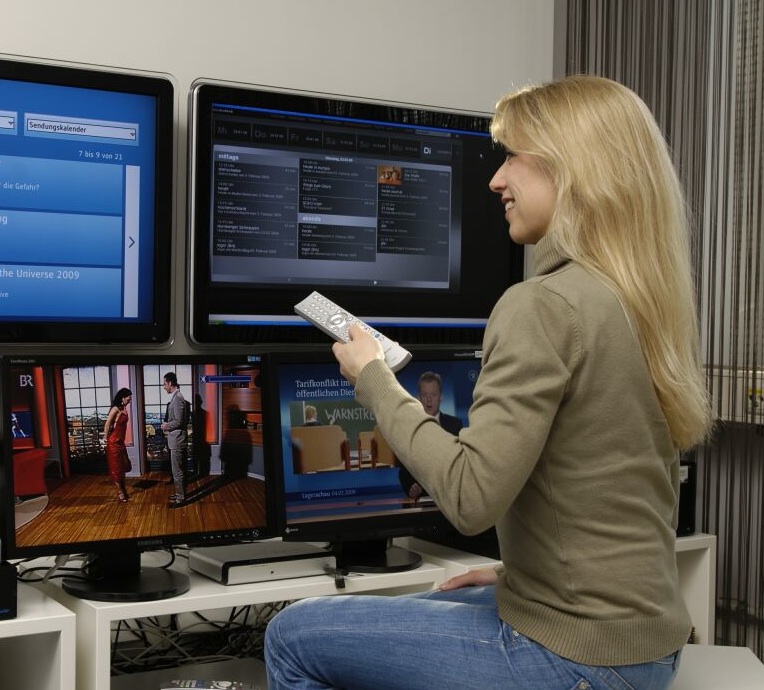PomeloTv: una nueva forma de ver televisión… en Internet
La plataforma PomeloTV, desarrollada por la empresa española ComoLAB, se presenta como la primera iniciativa privada que permitirá acceder a contenido audiovisual, tanto cine como televisión, en Full HD bajo demanda y sin apenas costes de infraestructura ya que, a diferencia de los CDN (Content Delivery Network) convencionales que precisan una amplia y costosa infraestructura de servidores, utiliza un sistema denominado de computación distribuida.
 La española ComoLAB acaba de presentar PomeloTV, una plataforma IPTV de vídeo bajo demanda con la que sus usuarios podrán desde su ordenador y con una conexión ADSL acceder a contenidos a la carta ofrecidos por canales y roductoras, en calidad Full HD y con sonido digital. Desde principios de 2007, los creadores de esta plataforma han dedicado miles de horas a la programación, la investigación y a definir la estrategia de negocio.
La española ComoLAB acaba de presentar PomeloTV, una plataforma IPTV de vídeo bajo demanda con la que sus usuarios podrán desde su ordenador y con una conexión ADSL acceder a contenidos a la carta ofrecidos por canales y roductoras, en calidad Full HD y con sonido digital. Desde principios de 2007, los creadores de esta plataforma han dedicado miles de horas a la programación, la investigación y a definir la estrategia de negocio.
PomeloTv tiene actualmente firmados acuerdos con más de veinte productoras, licenciadoras, canales y agregadores de contenido, con los que ha diseñado con sus partners una política de compartición de ingresos por consumo que permite rentabilizar el contenido bajo diferentes fórmulas de ingresos. De este modo, intenta construir así las bases más sólidas para un modelo de negocio sostenible y de futuro en la distribución de contenidos audiovisuales por Internet.
El cine de pago, a través de los canales actualmente disponibles, está generando en España un volumen de negocio de más de 120 millones de euros anuales, cifra que se espera que se multiplique en los próximos años a medida que el usuario consuma cada vez un mayor volumen de contenidos.
Para el usuario, el resultado es poder acceder a contenidos cien por cien legales, de alta calidad, a coste mínimo y flexible (paga únicamente por lo que consume) y sin tener que realizar inversiones adicionales en equipos, dispositivos o contratos de suscripción.
Según el Barómetro de Consumo Multimedia Europeo, publicado recientemente por Motorola, cada vez más usuarios españoles están accediendo a contenidos audiovisuales por medios diferentes de la televisión; así, el 49% hace streaming de vídeo a través de Internet, el 18% ve televisión a la carta y un 28% baja vídeo por Internet al menos una vez por semana. Asimismo, al 52% de los consumidores españoles les gustaría disfrutar de más programas en alta definición. En Suecia, la mayoría de los espectadores prefieren ver vídeo por Internet (48%) que ver películas o programas por televisión (28%).
El modelo tecnológico de PomeloTV es otro de sus diferenciadores clave, al permitir la difusión rápida y económica de grandes cantidades de contenido, con la máxima calidad, a miles de personas en todo el mundo.
A diferencias de los CDN (Content Delivery Network) convencionales, que precisan una amplia y costosa infraestructura de servidores, PomeloTV utiliza un sistema denominado de computación distribuida que aprovecha los recursos inactivos de la red- para la difusión de todo el contenido. De esta forma, obtiene un inestimable ahorro de costes de mantenimiento, consumo energético y ancho de banda, además de permitir la independencia de terceras partes.
Para las productoras, desde las más grandes hasta las independientes, PomeloTV supondría una nueva y excelente oportunidad para comercializar y promocionar sus producciones.
La plataforma está abierta a todas aquellas empresas relacionadas con el mundo audiovisual que quieran rentabilizar su contenido o simplemente llegar a más personas. PomeloTV tiene capacidad para albergar tantos canales como contenido sea susceptible de compartir, generar y monetizar por ello. La política de ingresos compartidos permite rentabilizar contenidos, tanto actuales como aquellos que se desea volver a relanzar, como es el caso de las series de televisión, o para presentar productos de nuevos creadores que deseen lanzar sus contenidos y en muchos no encuentran fácilmente la forma de darse a conocer e introducirse en el mercado.
Sus fundadores
Pomelo Tv es una iniciativa de la empresa ComoLAB impulsada por César Covarrubias y Ricardo Morales. Covarrubias es licenciado en Publicidad y RR PP por la UCM, máster en Comunicación por ESIC y diplomado en Diseño e Ilustrador por la escuela ArteDiez.
Dibujante, diseñador y emprendedor, ha desarrollado proyectos para Indra, Telefónica, Antena 3, RTVE, Iberia, Ministerio del Interior, Ferrovial, Junta de Andalucía, Junta de Castilla y León, Bolsa de Madrid, BBVA y Microsoft, entre otras compañías. Ha dirigido equipos mixtos de desarrollo y diseño en proyectos de TI y ha trabajado como consultor en proyectos de implantación de marca corporativa, desarrollo de experiencias de marca y diseño e implementación de estrategias de comunicación. Desarrolló la primera máquina de votación electrónica aprobada y utilizada en un proceso electoral en el mundo, concretamente en el Reino Unido. También ha desarrollado interfaces de reconocimiento de caracteres e interacción, sistemas de pantalla gigante interactiva y de vídeo y broadcasting, entre otros.
Además, César fue socio fundador de RedMusica, el portal de venta y servicios para la industria musical con más de 50 discográficas independientes españolas, y socio director de Spimedia, compañía especializada en TIC, antes de fundar en 2007 ComoLAB, laboratorio de ideas e investigación tecnológica.
Por su parte, Ricardo Morales, estudió Ciencias de la Información en la Universidad Complutense de Madrid y anteriormente había estudiado Arte y Cine en la Universidad de la Laguna y en el Taller de Artes Imaginativas de Madrid. En el año 2000 forma parte de la sociedad que pone en marcha lo que hoy se conoce como MVNOs (operadores móviles virtuales) en Abbla Mobile (joint venture con Telia Sonera en Suecia, Finlandia y Dinamarca) desarrollando lo que hoy ya es un contrastado modelo de negocio. Posteriormente, y con parte del consejo de esta empresa, se incorpora al equipo que desarrolla los primeros TPV bancarios basados en GRPS en Wex Point España, luego absorbida por Banesto, que fue así el primer banco en lanzar dichos dispositivos, presentes hoy en la mayoría de los comercios. Es durante esta etapa profesional cuando conoce a César Covarrubias, con quien, junto a los hermanos del Río, deciden crear PomeloTV.
Hijo de Martín Morales Morales, pionero de la televisión y la publicidad en España durante los años setenta y ochenta, Ricardo Morales es además consejero y asesor en varias compañías.
Did you like this article?
Subscribe to our NEWSLETTER and you won't miss anything.

















